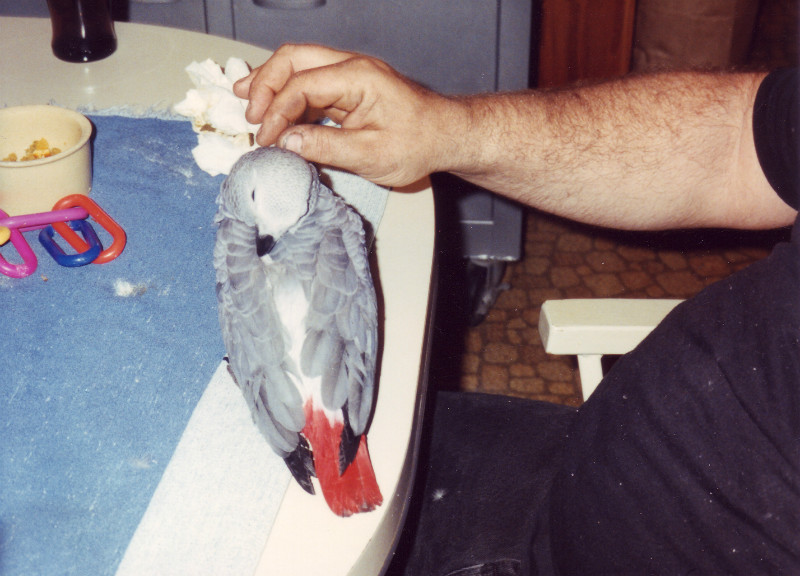African Grey
Myths |
|
So many myths surround this sensitive and intelligent companion bird. Some of these myths have assumed the status of fact by virtue of repetition, but repetition does not make them true. Some of the most common myths are "Greys are clumsy", "Greys need more calcium", "Greys pluck", "Greys are one person birds" and "Greys are shy". Nothing could be further from the truth. MYTH III - AFRICAN GREYS ARE ONE-PERSON BIRDS Greys are flock animals. A Grey in the wild has relationships on many levels - parental, sibling, juvenile flock acquaintances, older and wiser flock members, bonded mate, and parent to chicks among others. Communicating and interacting with many other birds is natural behavior for Greys. To restrict the number of relationships and the humans a Grey interacts with and is civil to, is contrary to his inborn propensities. Greys need their flock, and in captivity this need must be satisfied by humans. Greys may take time to develop relationships, but these relationships are very necessary for their psychological well being. Those who wish to have a relationship with a Grey must earn the privilege. Greys appear to be more cautious - I believe one of the reasons is because they are part-time ground feeders. A bird on the ground is more vulnerable than one who feeds in the tree-tops. When one is vulnerable, it pays to be careful and cautious. This caution spills over into other aspects of a Grey's life. A Grey's sensitivity to nuance and the environment, coupled with his caution and careful assessment, are a challenge we must meet if the Grey is to realize his full potential as a companion bird. The favored person has to be willing to share the bird for the bird's own good and has to be willing to persuade the bird to be civil to others. S/he should not be afraid that others - family or wife or husband - will "steal" the bird's affections. Developing relationships with multiple people also depends on those who wish to have a relationship with the bird. A Grey's love and trust have to be earned. They are not given to those with whom the bird has only a peripheral contact. If other family members aren't willing to make time for the bird, then the bird will not love, trust or be willing to interact with them. A Grey should not be coerced into relationships with family members who are not willing to make the effort or take the time to establish their own relationship with the bird. If there is no one in the family who is interested in the bird except the owner, the bird may become a one-person bird by default. If at all possible, the owner should expose the bird to friends, neighbors, and knowledgeable bird keepers. While it may be flattering for the favored person to have a bird who is unwilling to be touched by others, it is not good for the bird to have his world so narrow and confined. While we think that our life circumstances will not change, this may not always be the case. A civil well-behaved Grey will always have a home and loved ones should the unthinkable occur - divorce, death, separation, etc. The more relationships and the wider the circle of acquaintances a Grey has, the healthier it is, emotionally and psychologically, for the bird. Thought must always be given to the fact that a Grey can have a human life span and may have more than one home in his long life. How much better for the bird if he is gentle, well-behaved and accustomed to the attentions of others. Such a bird will never be passed from home to home - the pet potential decreasing with each move. Gentle, kind and patient handling will ensure that your bird is a pleasant, well behaved, lifetime companion. Cast yourself in a parental role. Be a teacher, a mentor, a model, a guide rather than an authoritarian figure. For our companion birds to love and trust us, we must be considerate and gentle with them. A calm kind-hearted approach will pay dividends that last the bird's whole lifetime. Coercing "good" or "acceptable" behavior from a Grey will place a heavy stress load on this sensitive being. A Grey cannot be punished into "good" behavior. He will turn his anger and frustration at this dominance inward. Coercion never brings love and trust - at best it brings grudging compliance. The price of this compliance may be illness because of the stress on the immune system, acting-out because of the frustration and avoidance, distaste and distrust of the dominating one. Often this distrust is reflected by a general dislike of humans. Attempting to dominate a Grey is a recipe for disaster - for the bird and for the owner. The development of a Grey's personality is on-going. As in humans, the past, the present and the inevitably changing environment all contribute to the dynamic development of personality. The humans in a bird's environment have an obligation to understand and accept that the bird has a right to be himself. Consistent, kind and patient handling and management of this ever-developing and maturing bird is the key to a happy bird and a happy owner. All rights reserved. No part of this article may be reproduced in any form or by any means, without permission from the author. |
